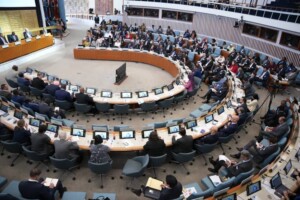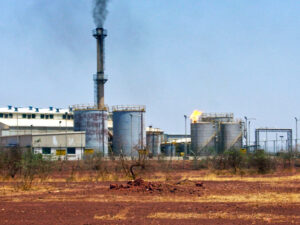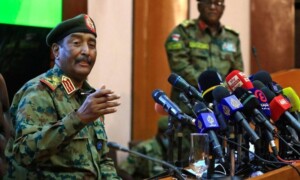Sudan rebels object to AU peace call threatening with sanctions
The Sudanese armed movements have objected to the new call by the African Union that urged all parties to return to the Darfur peace negotiation table on the basis of a Sudanese peace treaty that dates from 2011.
 SLM-MM leader Minni Arko Minawi (L) and Jibril Ibrahim, leader of the JEM (M), in a meeting of the Sudan Appeal alliance in Paris in January 2017. He is flanked by Yasir Arman of the SPLM-N faction. (RD)
SLM-MM leader Minni Arko Minawi (L) and Jibril Ibrahim, leader of the JEM (M), in a meeting of the Sudan Appeal alliance in Paris in January 2017. He is flanked by Yasir Arman of the SPLM-N faction. (RD)
The Sudanese armed movements have objected to the new call by the African Union that urged all parties to return to the Darfur peace negotiation table on the basis of a Sudanese peace treaty that dates from 2011.
Last week the African Union’s Peace and Security Council (PSC) pointed to “the lack of commitment on the part of the non-signatory Darfur armed movements” and urged them to engage discussions with the government on the basis of the Doha Document for Peace in Darfur (DDPD). The council urged mediators to make progress in the resolution of the Darfur conflict in the upcoming three months, and threatened to sanction those who continue to hinder the ongoing efforts for a lasting peace.
The Justice and Equality Movement (JEM) and the Sudan Liberation Movement (SLM-MM) of Minni Minawi's leadership have welcomed the call to revive the negotiating process over the next three months. But the holdout armed groups have so far refused to sign the DDPD after it was written in 2011, and find a resumption of peace talks based on this peace treaty a no-go.
Dr. Jibril Ibrahim Mohamed, JEM chairman, claimed that the mediating team itself is not capable of managing the negotiations. The AU-United Nations peacekeeping mission in Darfur (Unamid) is one of the mediators of the peace process “and it is moving closer to the government, while negotiations require that there should be an equal distance between the mediator and the negotiating parties”.
Speaking to Radio Dabanga, SLM leader Minni Arko Minawi said that the two armed movements sent two delegations of representatives to the Ethiopian capital Addis Ababa on Thursday. He declined to comment further on the content of the talks.
The AU Peace and Security Council has earlier called on the African Union’s High-level Implementation Panel (AUHIP) to communicate with the warring parties in Darfur within the next three months. The statement pointed out that the Doha Document for Darfur Peace ‘remains the most reasonable basis for engaging in resolving the conflict in the region’.
Another main armed group, the SLM led by Abdel Wahid El Nur (SLM-AW), has declined to join the process and rejected any outcome. El Nur informed Radio Dabanga about his stance, saying that “Instead of putting pressure on the regime whose president is wanted by the International Criminal Court, […] the AU is disregarding all of this and threatening others so they will sit with this regime, and it will remain protected.”
Peace attempts
The negotiations, under the auspices of the AUHIP collapsed in August 2016, as the government insisted on the 2011 Doha Document for Peace in Darfur as the basis for the talks, while the rebel movements have categorically rejected this agreement signed by Khartoum and a coalition of Darfur breakaway groups.
There have been several attempts to revive the talks by preparing an agenda, including sessions in Paris, France, in September last year and discussions in Germany.
According to Sudanese opposition parties and rebel movements, Al Bashir repeatedly declared a unilateral ceasefire to appease Washington regarding the permanent lifting of its economic sanctions against Khartoum.
On February 4, negotiations about the armed conflict in South Kordofan and Blue Nile between the Sudanese government and one of the two factions of the Sudan People’s Liberation Movement-North, led by Abdelaziz El Hilu (SPLM-N), were adjourned. Khartoum wants a definite agreement on security arrangements first, while the SPLM-N prioritises the delivery of humanitarian aid to the victims of the conflict.











 and then
and then